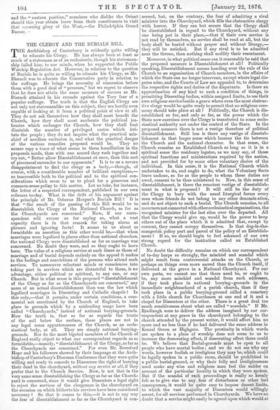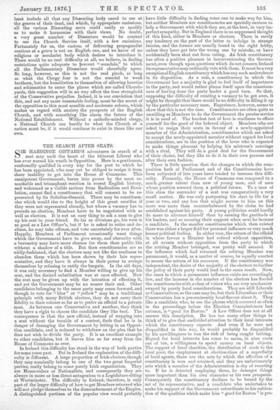THE CLERGY AND THE BURIALS BILL. T HE Archbishop of Canterbury
is evidently quite willing to educate his Clergy. He has always been at least as much of a statesman as of an ecclesiastic, though his statesman- ship failed him, to our minds, when he supported the Public Worship Regulation Act. However, in relation to the question of Burials he is quite as willing to educate his Clergy, as Mr. Disraeli was to educate the Conservative party in relation to the suffrage. He brings the necessity of concession before them with a good deal of " pressure," but we regret to observe that he does not attain the same measure of success as Mr. Disraeli attained in his crusade against the Tory fear of a popular suffrage. The truth is that the English Clergy are not only not statesmanlike on this subject, they are hardly even capable of looking at it from a political point of view at all. They do not ask themselves how they shall most benefit the Church, how they shall most moderate the political jea- lousies which endanger the Church, how they shall best diminish the number of privileged castes which irri- tate the people ; they do not inquire what the practical mis- chief of needless exclusion is, and what the practical danger of the various remedies proposed would be. They no sooner espy a trace of what seems to them humiliation in the proposals made, than with one accord they rush together and cry out, " Better allow Disestablishment at once, than this sort of piecemeal surrender to our opponents." It is to us a severe disappointment to find the clergy as a body,—though, of course, with a considerable number of brilliant exceptions,— so inaccessible both to the political and to the spiritual con- siderations which seem to us to plead for a generous and common-sense policy in this matter. Let us take, for instance, the letter of a respected correspondent, published in our own columns to-day. What is the drift of his argument against the principle of Mr. Osborne Morgan's Burials Bill ? It is that " the result of the passing of this Bill would be to disestablish the Clergy of the National Church, as far as the Churchyards are concerned." Now, if our corre- spondent will excuse us for saying so, what a vast capacity there is in that remark for taking alarm at phrases and ignoring facts! It seems to us about as formidable an assertion as this other would be,—that when marriages were legalised in places other than national churches, the national Clergy were disestablished as far as marriage was concerned. No doubt they were, and so they ought to have been. The value of a religious service at such times as those of marriage and of burial depends entirely on the appeal it makes to the feelings and convictions of the persons who attend such services. To manoeuvre reluctant minds or consciences into taking part in services which are distasteful to them, is no advantage, either political or spiritual, to any one, or any Church. But in what sense is this proposed " disestablishment of the Clergy as far as the Churchyards are concerned," any more of an actual disestablishment than was the law which legalised marriages in Dissenting and Catholic chapels In this only,—that it permits, under certain conditions, a cere- monial not sanctioned by the Church of England, to take place in grounds which by a misleading usage have been called "Churchyards," instead of national burying-grounds. Now the truth is, that so far as regards the trusts of the soil below the surface, these places are not in any legal sense appurtenances of the Church, as an eccle- siastical body, at all. They are simply national burying- grounds. Nor do the most bigoted members of the Church of England really object to what our correspondent regards as so formidable,—namely, " disestablishment of the Clergy, as far as the Churchyards are concerned." For even Mr. Beresford Hope and his followers showed by their language at the Arch- bishop of Canterbury's Diocesan Conference that they were quite willing and ready to concede to Dissenters the right of burying their dead in the churchyard, without any service at all, if they prefer that to the Church Service. Now, is not that in the very same sense disestablishing the Clergy as far as the Church- yard is concerned, since it would give Dissenters a legal right to reject the services of the clergyman in the churchyard on the occasion on which hitherto his services have been considered necessary 1' So that it comes to this,—it is not in any way the fear of disestablishment as far as the Churchyard is con- cerned, but, on the contrary, the fear of admitting a rival minister into the Churchyard, which fills the obstructive clergy with horror. If they can but secure that the Clergy shall be disestablished in regard to the Churchyard, without any one being put in their place,—that if their own service is not read by themselves, no service shall be read at all, but the body shall be buried without prayer and without liturgy,— they will be satisfied. But if any rival is to be admitted near the throne, then nothing shall mollify their resentment.
Moreover, in what political sense can it reasonably be said that the proposed measure is Disestablishment at all? Politically speaking, Disestablishment means handing over the rule of the Church to an organisation of Church members, in the affairs of which the State can no longer intervene, except where legal dis- putes arise, and the Courts of Law are appealed to, to determine the respective rights and duties of the disputants. Is there an approximation of any kind to such a condition of things, in permitting Dissenting bodies, within assigned limits, to use their own religious service beside a grave where even the most obstruc- tive clergy would be quite ready to permit that no religious cere- mony should take place at all V Politically, the Church is dis- established so far, and only so far, as the power which the State now exercises over the Clergy is transferred to some eccle- siastical authority not under the control of the State. In the proposed measure there is not a vestige therefore of political disestablishment. Still less is there any vestige of disestab- lishment in that larger sense which loosens the tie between the Church and the national character. In that sense, the Church remains an Established Church so long as it is in a spiritual sense the residuary legatee, as we may say, of those spiritual functions and ministrations required by the nation, and not provided for by some other voluntary choice of the individual. In this sense, it is the National Church which undertakes to do, and ought to do, what the Voluntary Sects leave undone, so far as the people to whom these duties are owed, consent to be thus ministered to. Now, in this sense of disestablishment, is there the remotest vestige of disestablish- ment in what is proposed ? It will still be the duty of the Clergy to bury with the usual liturgical forms every man whose friends do not belong to any other denomin ation, and do not object to such a burial. The Church remains, to all mourners not connected with other ecclesiastical organisations, the recognised minister for the last rites over the departed. All that the Clergy would give up, would be the power to keep others out of the place which it is admitted that, except by consent, they cannot occupy themselves. Is that dog-in-the- mangerish policy part and parcel of the policy of an Establish- ment ? If so, we should begin to feel ashamed of our own strong regard for the institution called an Established Church.
No doubt the difficulty remains on which our correspondent of to-day harps so strongly, the mischief and scandal which might result from controversial attacks on the Church, or perhaps on things even more sacred than the Church itself, if delivered at the grave in a National Churchyard. For our own parts, we cannot see that there need be, or ought to be, any more mischief and scandal from such addresses, if they took place in national burying-grounds in the immediate neighbourhood of a parish church, than if they took place in a public burying-ground called a cemetery with a little church for Churchmen at one end of it and a chapel for Dissenters at the other. There is a great deal too much sensitiveness about what are called " scandals." If Mr.
Rradlaugh were to deliver the address imagined by our cor- respondent at any grave in the churchyard belonging to the church attended by the present writer, it would affect him no more and no less than if he had delivered the same address in Kensal Green or Highgate. The proximity in which words are spoken to a place of worship does not seem to us to increase the desecrating effect, if desecrating effect there could be. We believe that Burial-grounds must be open to all people who have mortal bodies ; and we do not see why any words, however foolish or irreligious they may be, which could be legally spoken in a public room, should be prohibited in a public burial-ground, or why their folly and irreligiousness need make any wise and religions man feel the sadder on account of the particular locality in which they were spoken. But if the scandal of each proceedings is really so keenly felt as to give rise to any fear of disturbance or other bad consequence, it would be quite easy to impose decent limits, to which the vast majority of Dissenters would willingly assent, for all services performed in Churchyards. We have no doubt that a service might easily be agreed upon which would at least include all that any Dissenting body cared to use at the graves of their dead, and which, by appropriate omissions, all the various Dissenting sects could easily so modify as to make it harmonise with their views. No doubt, a very great number of Dissenters would be content to use the Church Service itself, with a few omissions. Fortunately for us, the custom of delivering propagandist orations at a grave is not an English one, and we know of no religious or secularist body which desires to introduce it. There would be no real difficulty at all, we believe, in finding restrictions quite adequate to prevent " scandals," to which all the Parliamentary Dissenters would cheerfully agree. So long, however, as this is not the real pinch, so long as what the Clergy fear is not the scandal to weak brethren, but the humiliation to themselves of allowing heretics and schismatics to enter the places which are called Church- yards, this suggestion will in no way affect the true stronghold of the Conservative prejudice. Indeed, it is our conviction that this, and not any more reasonable feeling, must be the secret of the opposition to this most sensible and moderate reform, which makes us regard with anxiety the prospects of the English Church, and with something like alarm the future of the National Establishment. Without a catholic-minded clergy, a National Church can hardly be what the Church of a nation must be, if it would continue to exist in times like our own.



































 Previous page
Previous page